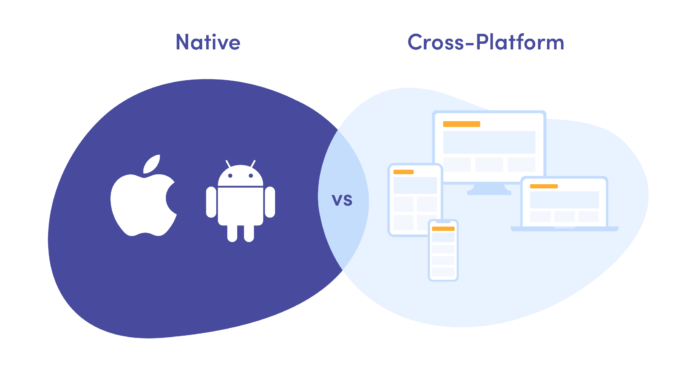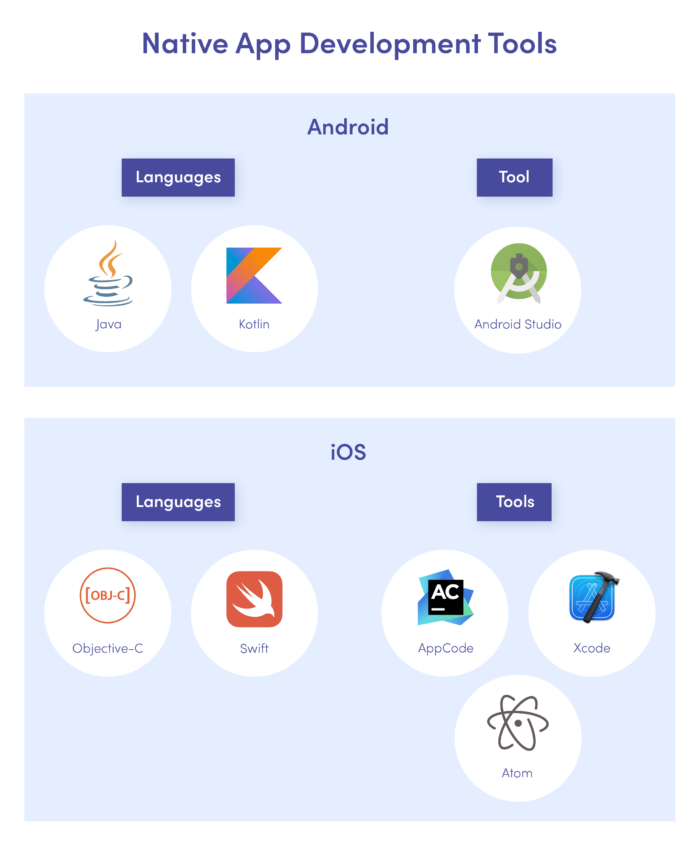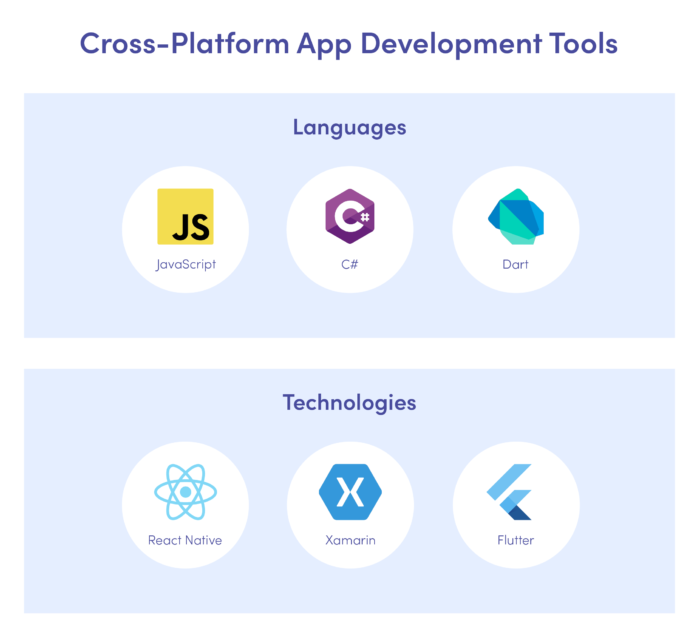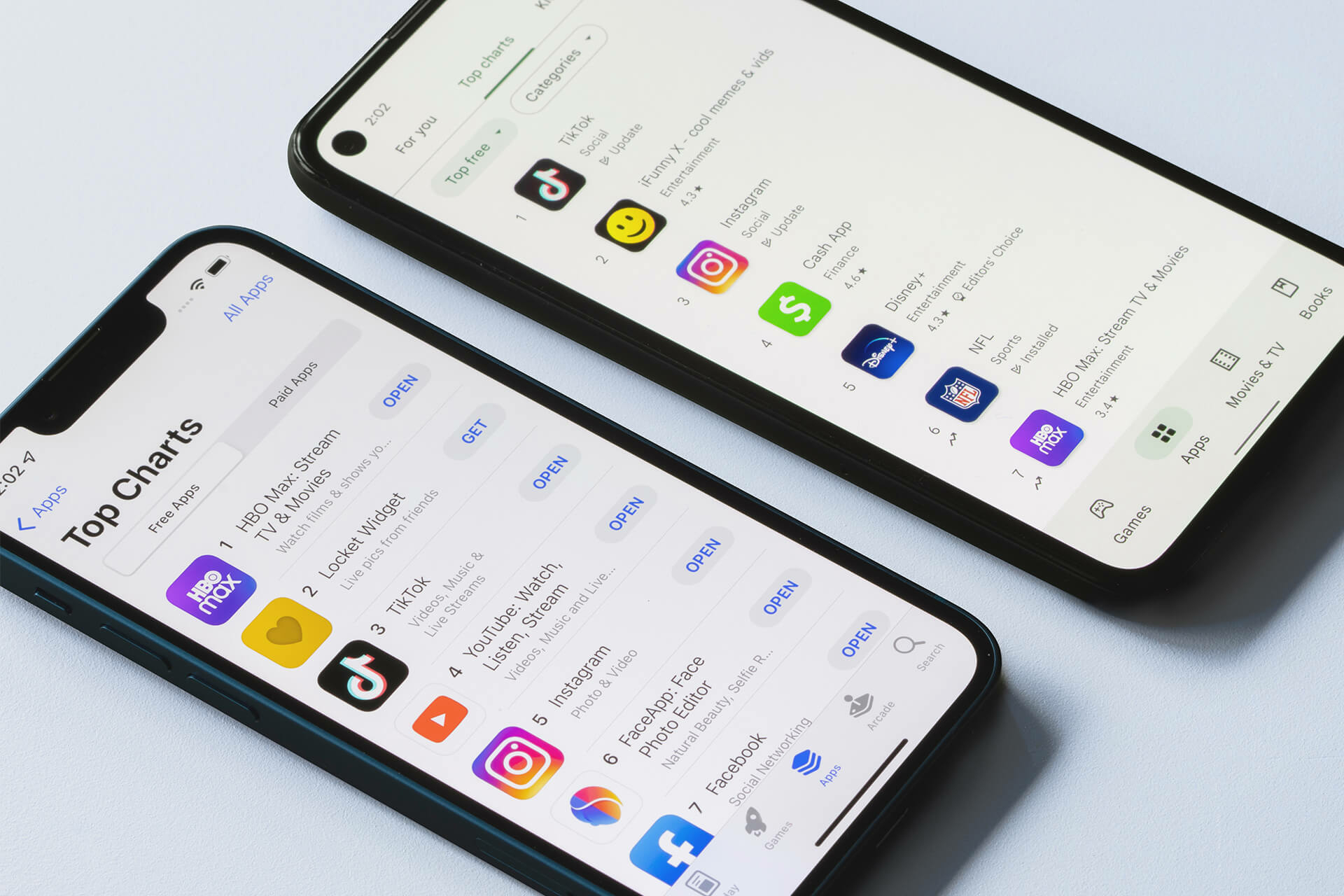In 2022, the Google Play store has over 3.2 million apps available, while the Apple App Store has over 2.1 million. With so many apps available to download, competition is fierce. This is why it’s so important to make the right choices for your next app project at every stage of the journey. You want to make sure your app serves its purpose effectively. One key decision you’ll face is whether to opt for native or cross-platform development. Choosing the right development for your app will depend on things such as use cases, cost, performance and your developers.
Read on our native app development vs cross-platform comparison to discover the differences and determine which approach best suits your specific needs and goals for your app.

What is native app development?
Native app development is the process of creating a mobile app exclusively for one native platform or device type, which is usually Android or iOS.
A native iOS app would never work on Android and vice versa. This is because different platforms require different development technologies and programming languages. For example, native app developers would use AppCode, Xcode or Atom to build an iOS app, but would need to use Android Studio to develop apps for Android. iOS apps require programming languages such as Objective-C and Swift, whereas Android uses Java and Kotlin. Put simply, this means that if you want your app to be available on multiple platforms and mobile devices, you would need your developers to build different versions of it.
While creating multiple different apps may seem like a drawback, native app development is an incredibly popular choice for many individuals and organisations. There are many good reasons for this.

Advantages of native development
1. Great user experience and performance
Native mobile app development utilises the capabilities provided by the particular operating system. For example, if you develop apps for iOS, it will be able to use all the capabilities that iOS offers. This has the effect of creating a fantastic user interface (UI) and user experience (UX) that are completely synonymous with the platform.
The direct link between the tools the app is built on, and the code means that native apps also have great performance, run quickly and are less likely to face issues such as lagging, bugs, crashing or failed launches.
Ultimately, native apps can be polished and perfected for each specific operating system so they look and run really well – keeping customers happy and engaged.
2. High security
Launching an app is exciting, but you need to account for the risks involved with cybercrime. Fortunately, native apps offer lots of security measures that can help protect your app. Native apps have access to built-in security features available on the operating system, for example, Apple’s face ID feature or multi-factor authentication.
3. New features
Because native apps are updated by the operating system’s owner – usually either Apple or Google, developers will be able to instantly take advantage of any new features. Apple and Google both frequently update their main programming languages so that they respond well to new system or hardware upgrades. This can help keep your app relevant, up-to-date and scalable for the future, by always allowing it to live up to the full potential of the iPhone or Android device.
4. Good offline performance
Native development is a popular choice for many because native apps run well without the need for an internet connection. Stable connections aren’t always possible and having your app run well even offline can be a huge advantage for your users. Still being able to access the app’s features without relying on the Internet will help provide a better user experience and is suited to everyday ‘necessity apps’ that involve maps, to-do lists or music.
Disadvantages of native development
1. Higher costs
Native app development can become pricey depending on a few different factors. If you want your app to be available on both iOS and Android devices, you will need multiple versions of the app developed – that’s two whole, stand-alone apps. This obviously increases the costs as you will need to account for more time spent developing, or hire more than one development team.
Additionally, native app maintenance costs can be high – reaching as much as 15-20% of the original development cost. Again, you’ll need to factor this in twice if you plan on launching both an iOS and Android app. This is needed if you want to keep your app functioning perfectly.
2. Development time can be a lengthy process
Creating multiple versions of your app adds the development time, too. The work done for one platform cannot be replicated for another – so you will need to double the work needed and account for longer development times.
If you realise later on that there are errors, your developers will need to create a solution for each version of the app, making fixes time consuming too.
What is cross-platform app development?
Cross-platform apps are those that are developed to operate on multiple platforms. With cross-platform mobile app, the same code will run both for iOS and Android platforms, so your developer will only need to build one version for it to work across everything.
Javascript, C# and Dart are common programming languages used for cross-platform app development. There are also many popular cross-platform frameworks including React Native, Xamarin and Flutter.
If you are unsure which framework is better for your app, check out our blog for a detailed comparison of Flutter vs React Native.

Advantages of cross-platform mobile development
1. Lower costs
One of the key benefits of cross platform apps is that they are usually much more cost-effective to develop. You won’t need to pay nearly as much as you would for native app development, as you will only require hiring one development team with a specific set of skills, rather than multiple teams with varying skill sets.
Cross-platform is also a great way to cost-effectively test your app with a particular market. You’ll be able to get it out to them at a fraction of the price of a native app.
2. Huge time savings
Additionally, the fact that cross-platform apps are designed to run on multiple platforms using the same code, your custom mobile app developers will be able to deliver much quicker than with a native app.
Time is incredibly valuable to many businesses that want to stay one step ahead of their customers. Cross-platform apps allow you to respond to customer needs and wants quickly, delivering apps that are tailored to them before they lose interest.
3. Larger exposure
Cross platform development gives your app and business much greater exposure and a broader market reach. Developing a native app just for iOS, for example, means you won’t be exposed to 74.43% of the 5 billion mobile users that use Android apps. Cross-platform mobile apps ensure that your app gets the most visibility, increases your revenue potential and exposes your business to the maximum number of people.
4. Brand consistency
If you’re looking to keep the complete look and feel of your app consistent across different platforms and devices, then cross-platform is a good choice. Unlike with native mobile apps, cross platform will allow you to keep every single detail, all the functionality and the UI exactly the same. Native apps are developed with a specific platform in mind, so two versions of the same app may look very different in actuality.
Disadvantages of cross-platform development
1. Limited functionality
Cross-platform development can face issues with limited functionality. When building cross-platform apps, developers will need to account for a huge number of different devices. This can mean limitations in aesthetics and functionality. Developers need to make sure the app will work on all Android devices as well as iOS, which are vastly different. This means that some of the sleek features available on some devices, like iOS’ scanning text from photos feature, won’t be an option.
This means that user experience can suffer. Accounting for different mobile operating systems and more constraints means that the app might look clunky or inharmonious on some devices.
2. Slower speed and worse performance
Unfortunately, cross-platform apps can suffer when it comes to performance. Broadly speaking, when comparing the performance of a native app vs a cross platform app, native will be slightly faster and less likely to face performance-related issues.
Since the code is not highly-specified to a device or platform, it can create some delays for some users. Moreover, as cross-platform apps need to be compatible with a wide category of programming languages and operating systems, they can be more susceptible to bugs.
Slower speeds and issues like bugs may negatively affect the user experience too. If an app isn’t running fast enough, or prevents the user from using it properly, they are more likely to discontinue using it or rate it poorly in the App / Google Play store.
3. Slower time for new features
Every time Apple or Google launch a new feature for iOS or Android, it can take longer to update apps that are built using cross-platform development than it does for native apps. Native apps are provided with the updates much faster.
4. Adaptability with 3rd party libraries
Cross-platform development relies on third party libraries which provide developers with the opportunity to integrate software that is already tested and is reusable. While this can be viewed as a benefit as it helps save time and cost, there is typically less support for cross-platform development tools and third party libraries that it relies on. This can make it more challenging for developers to integrate new or complex features into the app.
Native vs cross-platform development: Making the decision
There’s no clear and definite winner when it comes to native vs cross platform development. Whether one is better or worse depends completely on your specific needs. To help make your decision, check out the table below.
| Your needs | Best option |
|---|---|
| You need exceptional functionality and performance | Native development |
| Your app doesn’t need complicated graphics, animation or other complex functionalities | Cross-platform development |
| You need an app that will operate offline | Native development |
| You don’t necessarily need your app to work offline | Cross-platform development |
| You have a flexible / longer time frame | Native development |
| You need your app created quickly | Cross-platform development |
| You have a flexible / higher budget | Native development |
| You have a limited / lower budget | Cross-platform development |
| You want to target specific audiences and customer bases | Native development |
| You want to target a broad, large audience across multiple different markets | Cross-platform development |
| You need a polished and perfected app | Native development |
| You need a prototype or MVP to test the market | Cross-platform development |
| Your app requires specific hardware / platform capabilities | Native development |
| You want your app to work the same across all platforms and devices | Cross-platform development |
Summary
As we’ve covered, when launching a new app, you have two choices: a native app for each platform, or a cross-platform app that will solve multiple purposes.
Native app development may be a more attractive option for those looking to create an app with a specific platform in mind, with great functionality and optimal performance. However, those opting for native development must be able to account for longer development times and higher costs.
If you’re looking to create a native iOS or Android app, get in touch with our team to find out more about working with Miquido as your development partner. Experts in Swift (iOS), Java (Android) and Kotlin (Android) development, our experienced developers are able to work closely with you to create the iOS or Android app you’re dreaming of.
Cross-platform development is likely to appeal to those who want to get their app out there quickly and cost-effectively, as well as those that want their app to be available to a wide audience. However, those looking to choose cross-platform will need to consider potential performance or user experience issues.
If you’ve decided that a cross-platform app is for you, let our team know and we’ll explore how we can work to meet your needs as your software partner. We work closely with core developers from Google and have previously built one of the first apps ever made in Flutter. We’re also experts in React Native app development and have built powerful apps for companies including Salesforce and Cisco.








